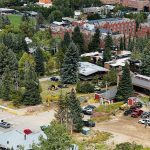Saddle Sore: Chasing what matters

You hear it a lot these days — “Aspen, huh? Must be a trust-funder or new-rich, one of those billionaires, I reckon.” Yep, must be so. It’s a conundrum we face, and I don’t mean the creek or hot springs. Real estate prices are through the roof; a quiet dinner for two costs like a mortgage payment. There’s even a billionaire’s club.
Although Aspen is generally touted as growing richer, is there another side to the coin, one that signals poorer? Perhaps. Before my tirade, a confession: I was born into wealth. Not the kind measured in bank accounts, but in my grandfather’s kitchen, splitting a beer while we cooked up a couple of grouse for dinner or maybe a couple of trout we’d caught from Woody Creek. No one talked about how fortunate we were; we just lived it.
Or those days, a couple years later, my great-uncle Tom Stapleton taking me to the Red Onion or Ski ‘n’ Spur for a coke while he had one or two drafts with his old mining buddies. And afterwards, we’d sit on the back porch of his house, watching the sun set over Aspen while we smoked a roll-your-own Prince Albert cigarette.
It just happened naturally. That kind of fortune grows on one gradually, over time. I mean, what can you tell a baby or a 5-year old, or even a teenager, anyway? Oh, occasionally I got the usual “You are so lucky” or “I wish I could trade places with you.” Believe me, there were days I’d willingly trade with whoever said that, but I got over it rather quickly.
We were ranchers, generationally hooked to the land, and most of us called our outfits ranches, not “the property” as some newcomers were known to call land they had just bought. We are proud of our heritage, and for the most part, our world was in green grass, cattle, horses, fresh air, mountains, and uncrowded quiet.
Take some of that back — our world also had skiing, school on Hallam Street, Pinocchio’s, Aspen Drug, Matthew Drug, the Hotel Jerome, the Sweet N’ Snack Shop. We came back after college and joined up with the few who stayed. Many of our friends left after high school and then, a few years later, wanted to return — the town had become too difficult for them to come back.
People often say, when they learn how long I’ve lived here, “Wow, you must have seen a lot of changes.” Yes and no. There were a lot of changes, unquestionably, and although we maybe didn’t recognize it as such, those changes, even as slowly as they seemed to come, were chipping away at our treasure.
We were a select group, most of us working in town. Some owned houses, or lived with their parents, and there were the perennial houses and apartments for rent each seasonal change. We reasonably knew most people in town, as well as knowing where most of them lived. We were a community.
There were some great watering holes: the Red Onion, which friends referred to as my office; Guido’s, where I kept a tab; the Pub (Jerome B. Wheeler Public House), in the basement under the opera house; Cooper St. Pier; and for some of us, there were the private clubs of those days — the Eagles and Elks clubs. Except for the Eagles and Elks, those great bars now exist only in memory.
The changes have occurred, the ones I might have seen coming. Not even professional folks like doctors and lawyers can afford to buy a house close to their work. Worker bees — the ones who keep the town going by waiting tables, tending bars, operating ski lifts, doing construction work, plumbers, house-keepers, or retail workers — not many of them live in town anymore.
They are forced to commute from downvalley towns, some as far away as Parachute or even Grand Junction. And the city fathers and those who still can afford to live in town are unhappy with the amount of unavoidable automobile traffic caused by those very commutes. The wealth that made this valley vibrant — time, space, community — has been teetering.
The money, let’s not forget, has become almost king. McMansions on the formerly beautiful mountainsides, hiking and horse-backing trails once lonesome now crowded with hikers and mountain bikes, ranches previously green now cluttered with houses and sheds.
Money is a tool; wealth is a state of being. And in chasing the first, Aspen risks losing the second.
Tony Vagneur writes here on Saturdays and welcomes your comments at ajv@sopris.net.
Tony Vagneur writes here on Saturdays and welcomes your comments at ajv@sopris.net.
Four Aspen restaurants receive recognition in the 2025 Michelin Guide Colorado
The Michelin Guide Colorado published its 2025 list on Monday, with four Aspen restaurants included in the prestigious lineup.









